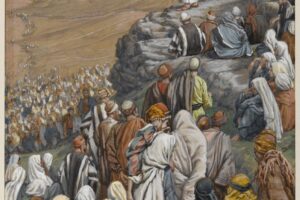PURSUE JESUS OF REVELATION FIRST
Pursuing Jesus Christ–God’s greatest revelation to mankind (John 3:16; 1 Timothy 3:16)–is more important than seeking to know the mysteries that the Lord presented in the book of Revelation. The Apostle John who wrote Revelation, said many of the signs and things Jesus did were written about that you might believe he is the Christ, the Son of God; and that in believing you might have life through his name (John 20:30-31). However, Jesus said he sometimes spoke in parables or symbolic language so that born-again believers might understand the secret things of God’s kingdom; and that unbelievers might not understand (Mark 4:10-12). Being born again and being conformed to the likeness of our Lord Jesus Christ should be our primary pursuit (John 3:3,5; Romans 8:29).
After the Apostle Paul was born again and filled with the Holy Spirit, the Lord allowed him to fathom deep mysteries and revelations of God’s kingdom (2 Corinthians 12:1-7). But Paul said the person who is not born again of the spirit is not able to comprehend things of the Spirit or kingdom of God (1 Corinthians 2:14). Moreover, Paul said if we understand all mysteries and do not have God’s love it does not profit us anything. Godly love for the Lord and others is the only gift of the Spirit that has heavenly value and goes with us to heaven (1 Corinthians 13).
JESUS SPEAKS TO HIS PEOPLE IN REVELATION

In the first chapters of Revelation Jesus speaks to his born-again people about their various needs for spiritual growth. He lovingly advises the people of his seven churches on being more like the Lord, before he tells them about things which must shortly come to pass. Seven in the Bible often represents completeness or perfection (Genesis 2:2; Exodus 20;8; Exodus 25:31-37). Seven churches could possibly represent the entire body of believers in Jesus Christ; including each believer who is a part of it (1 Corinthians 12:27).
Below is an illustration of Jesus’ assessment of his churches, and the advice he gives them for spiritual growth. But the Lord felt it important for his people to know, “those whom I love, I rebuke and discipline. So be earnest and repent” (Revelation 3:19).
1-Ephesians (Rev. 2:1-7)….. Licentious/Loose………………Repent
2-Smyrna (Rev 2:2-11…Persecuted/Suffering… Be faithful unto death
3-Pergamus (Rev 2:12-17)…Backslidden/Lost first love…Repent
4-Thyatira (Rev 2:18-29)……Dead……………………Repent
5-Sardis (Rev #:1-6)…………Lax/False doctrines……… Repent
6-Philadelphia (Rev 3:7-13)…Faithful………………………Hold fast
7-Laodicea (3:14-19)………Lukewarm………………Repent/Be zealous
JESUS’ MESSAGE IS APPLICABLE TODAY
We should assess ourselves in light of the message of Jesus to his believers (1 Corinthians 12:27). And we ought to be mindful that he said: “those whom I love, I rebuke and discipline. So be earnest and repent.” (Revelation 3:19).
We should continually examine ourselves in light of God’s Word, which is designed not to condemn, but to grow us into the likeness of God’s Son, Jesus Christ (2 Timothy 2:16-17; Romans 8:29).
PURSUE THE MYSTERIES AFTER JESUS

In Revelation, Jesus first addressed his churches about their spiritual growth. Then he elaborated on “things which must shortly take place.” (Rev1:1-6; Matthew 13:10-11; Proverbs 25:2). About a thousand years have passed since Revelation was written. If interested, you might pursue a better understanding of what has come to pass and what is yet to come regarding Revelation. Recognizing that Jesus gave Revelation to his people as “kings and priest unto God” (Rev 1:6), you might pray and ask the Lord to lead you in a study and better understanding of the mysteries of Revelations (James 1:5; 2 Timothy 2:15; Tim. 3:16-!7).
Although Revelation may be intriguing, the biblical Word of God teaches us that understanding the mysteries of Revelation per se cannot save us or make us more like Jesus. The Bible says that believing in, obeying and loving the Lord God with all our heart, and our neighbor as ourselves are our greatest possible achievements—These things bring us salvation and conform us into the image of God’s Son, Jesus Christ (John 3:16; Mark 12:30-31; Romans 8:29).







